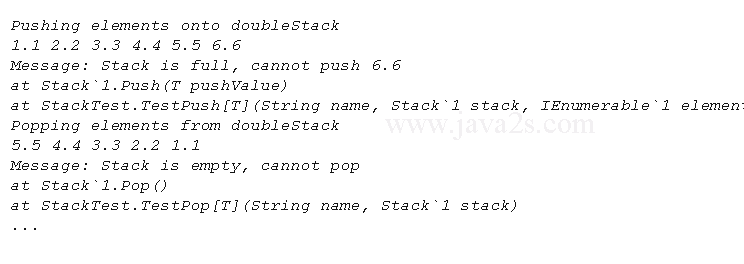Pass generic Stack as parameter - CSharp Data Structure Algorithm
CSharp examples for Data Structure Algorithm:Stack
Description
Pass generic Stack as parameter
Demo Code
using System;//from ww w . java 2 s. com using System.Collections.Generic; public class EmptyStackException : Exception { // parameterless constructor public EmptyStackException() : base("Stack is empty") { } // one-parameter constructor public EmptyStackException(string exception) : base(exception) { } // two-parameter constructor public EmptyStackException(string exception, Exception inner) : base(exception, inner) { } } public class FullStackException : Exception { // parameterless constructor public FullStackException() : base("Stack is full") { } // one-parameter constructor public FullStackException(string exception) : base(exception) { } // two-parameter constructor public FullStackException(string exception, Exception inner) : base(exception, inner) { } } public class Stack<T> { private int top; // location of the top element private T[] elements; // array that stores stack elements // parameterless constructor creates a stack of the default size public Stack() : this(10) // default stack size { } // constructor creates a stack of the specified number of elements public Stack(int stackSize) { if (stackSize <= 0) // validate stackSize { throw new ArgumentException("Stack size must be positive."); } elements = new T[stackSize]; // create stackSize elements top = -1; // stack initially empty } public void Push(T pushValue) { if (top == elements.Length - 1) // stack is full { throw new FullStackException( $"Stack is full, cannot push {pushValue}"); } ++top; // increment top elements[top] = pushValue; // place pushValue on stack } // return the top element if not empty, // else throw EmptyStackException public T Pop() { if (top == -1) // stack is empty { throw new EmptyStackException("Stack is empty, cannot pop"); } --top; // decrement top return elements[top + 1]; // return top value } } class StackTest { // create arrays of doubles and ints private static double[] doubleElements = {1.1, 2.2, 3.3, 4.4, 5.5, 6.6}; private static int[] intElements = {1, 2, 3, 4, 5, 6, 7, 8, 9, 10, 11}; private static Stack<double> doubleStack; // stack stores doubles private static Stack<int> intStack; // stack stores ints static void Main() { doubleStack = new Stack<double>(5); // stack of doubles intStack = new Stack<int>(10); // stack of ints TestPush(nameof(doubleStack), doubleStack, doubleElements); TestPop(nameof(doubleStack), doubleStack); TestPush(nameof(doubleStack), intStack, intElements); TestPop(nameof(doubleStack), intStack); } private static void TestPush<T>(string name, Stack<T> stack, IEnumerable<T> elements) { try { Console.WriteLine($"\nPushing elements onto {name}"); foreach (var element in elements) { Console.Write($"{element} "); stack.Push(element); // push onto stack } } catch (FullStackException exception) { Console.Error.WriteLine($"\nMessage: {exception.Message}"); Console.Error.WriteLine(exception.StackTrace); } } private static void TestPop<T>(string name, Stack<T> stack) { try { Console.WriteLine($"\nPopping elements from {name}"); T popValue; // store element removed from stack while (true) { popValue = stack.Pop(); // pop from stack Console.Write($"{popValue} "); } } catch (EmptyStackException exception) { Console.Error.WriteLine($"\nMessage: {exception.Message}"); Console.Error.WriteLine(exception.StackTrace); } } }
Result
